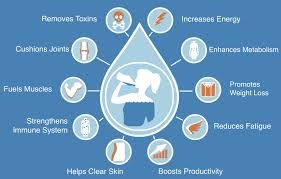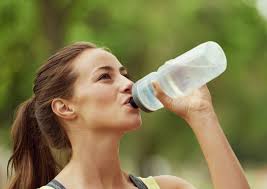In 2024, maintaining optimal health and wellness continues to be a priority for many people. Among the myriad factors contributing to a healthy lifestyle, hydration stands out as a fundamental yet often overlooked aspect of nutrition. This article explores the significance of hydration, provides tips for maintaining proper fluid balance, and highlights the impact of hydration on overall health.
1. The Crucial Role of Hydration

1.1 Understanding Hydration
Hydration refers to the process of maintaining an adequate balance of fluids in the body. Water is essential for numerous bodily functions, including digestion, circulation, temperature regulation, and waste elimination. Proper hydration ensures that the body operates efficiently and supports overall well-being.
1.2 The Benefits of Staying Hydrated
- Improved Physical Performance: Proper hydration enhances endurance, strength, and flexibility. Dehydration can lead to fatigue, decreased coordination, and impaired performance.
- Enhanced Cognitive Function: Adequate water intake supports brain function, including concentration, memory, and mood regulation.
- Healthy Skin: Hydrated skin is more elastic and less prone to dryness and wrinkles. Drinking sufficient water helps maintain a youthful appearance.
- Digestive Health: Water aids in digestion by facilitating the breakdown of food and preventing constipation.
- Temperature Regulation: Hydration helps regulate body temperature through sweating and respiration.
2. Hydration Needs: How Much Water Is Enough?
2.1 Recommended Daily Intake
The amount of water needed varies depending on factors such as age, gender, activity level, and climate. Generally, the National Academies of Sciences, Engineering, and Medicine recommend:
- Men: About 3.7 liters (125 ounces) per day.
- Women: About 2.7 liters (91 ounces) per day.
These recommendations include all fluids consumed, not just water. However, individual needs may vary, so it’s important to listen to your body and adjust your intake as needed.
2.2 Signs of Dehydration
Recognizing the signs of dehydration is crucial for maintaining proper hydration. Symptoms include:
- Thirst: A strong urge to drink fluids.
- Dark Urine: Concentrated, darker-colored urine.
- Dry Mouth and Skin: Lack of moisture in the mouth and skin.
- Fatigue: Feeling tired or lethargic.
- Dizziness: Lightheadedness or feeling faint.
If you experience these symptoms, it’s essential to increase your fluid intake and seek medical advice if necessary.
3. Effective Hydration Strategies
3.1 Drink Water Regularly
Make it a habit to drink water throughout the day. Carry a reusable water bottle with you and take sips regularly. Setting reminders can help you stay on track.
3.2 Infuse Your Water
If you find plain water boring, try infusing it with fruits, vegetables, or herbs. Popular combinations include lemon and mint, cucumber and lime, or berries and basil. Infused water adds flavor without extra calories or sugars.
3.3 Monitor Fluid Intake
Keep track of your daily fluid intake to ensure you’re meeting your hydration goals. Many smartphone apps and fitness trackers offer features to help you monitor your water consumption.
3.4 Hydrate Before, During, and After Exercise
Proper hydration is particularly important during physical activity. Drink water before exercising to start well-hydrated, continue sipping throughout your workout, and rehydrate afterward to replace lost fluids.
3.5 Eat Hydrating Foods
Incorporate water-rich foods into your diet to boost hydration. Fruits and vegetables such as watermelon, cucumbers, oranges, and strawberries have high water content and contribute to your overall fluid intake.
3.6 Adjust for Climate and Activity
Increase your fluid intake in hot or humid weather to compensate for additional fluid loss through sweating. Similarly, if you’re engaging in strenuous physical activities, ensure you’re drinking more water to stay hydrated.
4. Common Hydration Myths
4.1 Myth: You Need to Drink 8 Glasses of Water Daily
While the “8×8” rule (eight 8-ounce glasses) is a common guideline, individual hydration needs vary. Factors such as body size, activity level, and climate play a role in determining the right amount of water for you.
4.2 Myth: All Fluids Count the Same
While all fluids contribute to hydration, water is the best choice for maintaining optimal fluid balance. Beverages like caffeinated drinks and alcohol can have diuretic effects and may not be as effective in hydrating the body.
4.3 Myth: You Can Overhydrate
While it’s important to stay hydrated, it’s also possible to overhydrate, leading to a condition called hyponatremia (water intoxication). This occurs when excessive water dilutes sodium levels in the blood. Balance is key to proper hydration.
5. The Link Between Hydration and Overall Health

5.1 Hydration and Weight Management
Staying hydrated can support weight management by helping you feel full and reducing the likelihood of mistaking thirst for hunger. Drinking water before meals can aid in portion control and appetite regulation.
5.2 Hydration and Mental Health
Adequate hydration is linked to better mood and cognitive function. Dehydration can contribute to irritability, decreased concentration, and feelings of anxiety. Maintaining proper fluid balance supports mental well-being.
5.3 Hydration and Disease Prevention
Proper hydration plays a role in preventing various health conditions, including kidney stones, urinary tract infections, and gastrointestinal disorders. Drinking sufficient water supports overall organ function and reduces the risk of these issues.
6. Conclusion
In 2024, the importance of hydration cannot be overstated. Proper fluid intake supports numerous aspects of health, including physical performance, cognitive function, and overall well-being. By adopting effective hydration strategies, recognizing the signs of dehydration, and understanding common hydration myths, you can ensure that you are meeting your hydration needs and supporting your overall health.
Remember, staying hydrated is a continuous process that involves making mindful choices about your fluid intake and incorporating water-rich foods into your diet. Prioritizing hydration as part of your daily routine can lead to improved health outcomes and a more vibrant, energetic lifestyle.

